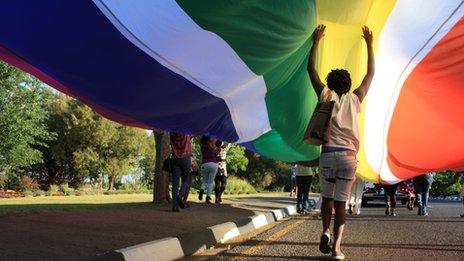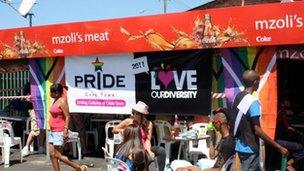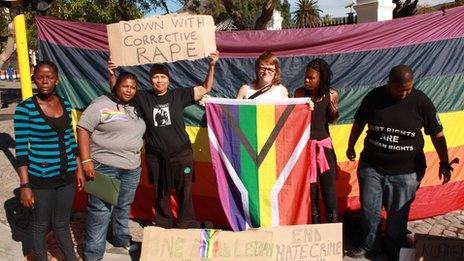South Africa targets rainbow tourists
- Published

Cape Town is hoping to become the number one destination for gay holidaymakers, and last year it attracted 200,000 gay tourists
There is arguably no worse place in the world to be gay than Africa. Today more than two-thirds of African countries have laws criminalising homosexual acts and across the continent the imprisonment, murder and abuse of gays has become part of the fabric of society.
So to many Africans the Rainbow Flag, which has emerged as one of the most powerful and recognisable 21st Century symbols of gay rights, is an unknown quantity.
Now tourism chiefs in South Africa want to transform the "Rainbow Nation" into a tourist safe-haven for gay and lesbian travellers.
Cape Town is hoping to usurp Rio, Toronto and Tel Aviv to become the world's favourite gay destination and win a big slice of the "pink tourism" market which is worth an estimated $80bn ($50bn) worldwide.
'Most wanted'
South Africa has the continent's only opened gay only hotel.
The eight double rooms in Cape Town's Amsterdam House, founded in 1998, are usually fully booked.
The hotel's manager, Lourens Botha, says other businesses are benefiting from the regular influx of gay visitors.
"Other hotels have experienced a downturn," said Mr Botha. "But we are experiencing consistent business and a high rate of returning gay travellers.
"In South Africa we have had our own challenges. Under apartheid you couldn't admit to being homosexual. You would be persecuted and imprisoned.
"This is now happening in other parts of Africa but our liberty allows us to help our fellow African gays.
"Today I run a hotel where openly gay men from all over Africa come and feel comfortable. They are astonished at how relaxed things are here.
"In their home countries they face persecution, violence and even death but here, if only on holiday, they can be free".

The gay tourism market is bringing in money for local businesses
Last year, in a survey carried out by the publication Out There, North American travellers ranked South Africa as the third "most wanted" travel destination.
Cape Town, where 10% of all tourists who visit the city are said to be gay, also won status as a worldwide favourite by Out and About magazine.
And according to the International Global Gay and Lesbian Travel Association (IGLTA) South Africa, and Cape Town in particular, may soon realise its ambition to become the number one destination in the gay market.
Last year alone an estimated 200,000 gay tourists holidayed in Cape Town.
'Walk on the beaches'
South Africa's laws and constitution have helped to make all this possible.
It was the first country in Africa to legalise same-sex marriage, and only the fifth in the world to do so.
And today the Rainbow Nation remains the only country on the African continent that accepts same-sex relationships, after gay rights were enshrined in the post-apartheid constitution, drawn up 19 years ago.
Eugene Brockman of IGLTA South Africa believes the country is becoming a safe haven for gays across the continent.
"The popularity of the Rainbow Nation amongst gay travellers is thanks to liberal laws and the fact that this is the only place in Africa where you can be openly gay.
"You can walk on the beaches, go on safari and eat in restaurants as gay partners.
"We are also attracting gays from all over Africa itself and for those forced to stay in the closet in their home countries, South Africa is liberating."
Businesses across the country are also becoming more aware of the value of the pink rand.
This year the United Nations World Tourism Organization singled out South Africa in its Global Report on lesbian, gay, bisexual and transgender (LGBT) tourism.
It said progressive attitudes in South Africa as well as Argentina, India, Spain and Mexico had attracted the gay market in droves.
It cited events such as Gay Pride, the Pink Loerie Mardi Gras, the Out in Africa Film Festival, Mother City Queer Projects and Mr Gay South Africa as some of the reasons for its popularity.
Prejudice remains

Lesbians in South Africa have experienced shocking violence, such as "corrective rape"
But not everyone is comfortable with this progressive attitude.
There are reports that the National House of Traditional Leaders, which advises the government on traditional customs of ethnic groups, has called for parliament to restrict gay and lesbian rights.
But the City Press newspaper says the ruling ANC is committed to equality and the right to freedom of sexual expression.
Fanney Tismong, an acclaimed Johannesburg based film-maker who specialises in gay issues and township life, says huge strides have been achieved in South Africa but he agrees deep prejudices still remain in many parts of the country.
He explains that lesbian women in South Africa are still targeted for so-called "corrective rape" and many gays in the townships live in fear of sexual assault and murder.
More than 30 women have been killed in South Africa in the past two years because of their sexuality.
"We have an established gay film festival, Out in Africa, which allows us to platform same-sex couples issues and these matters are now being openly discussed in the media and by mainstream society.
"As a consequence, gay couples are increasingly receiving a lot of support in South Africa.
"But there are still issues, particularly for the lesbian community in the country who have experienced shocking discrimination.
"We are making progress and we stand out alone in this regard in Africa, but we are not quite at the end of the rainbow yet".
- Published30 June 2011
- Published7 December 2011
- Published16 March 2012